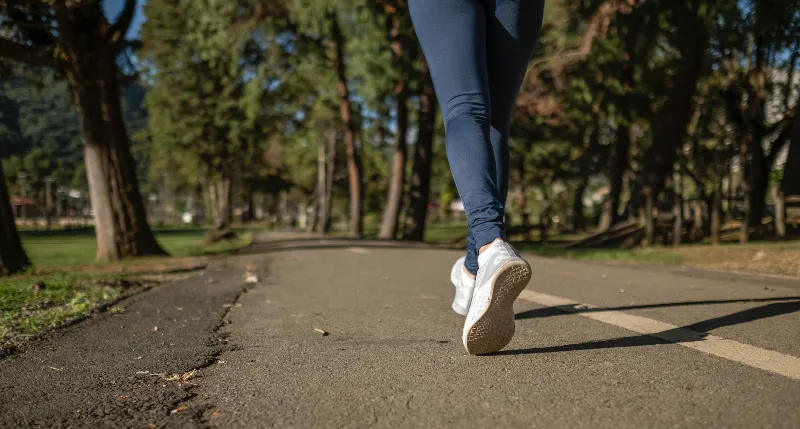Benefits of exercise on your mental health
Exercise and mental health are interconnected. In this article, we will go through all the potential benefits of exercise for your mental health.
When you are struggling with mental health symptoms, it can be very hard to start exercising. However, understanding how it will benefit you, as it gently holds your hand and walks you back towards balance, can be very helpful. You can just begin wherever you can, even if it just means walking for ten minutes around your own home.
If you are not struggling with mental health symptoms, making exercise a non-negotiable part of daily life can be excellent for your overall mental health, improving focus, mood, and motivation!
How does exercise benefit mental health?
Exercise and movement are strong pillars of health in both Ayurveda and functional medicine. The profound benefits on the physiology cannot be ignored. How does it help your different systems?
1. Movement or exercise around the abdominal region supports healthy digestion. Regular movement can strengthen your digestive system and improve elimination. Exercise and gravity help movement of food through your whole gastrointestinal tract. When your body is moving, it improves circulation throughout your body, including your gastrointestinal system; it speeds up your metabolism allowing you to use food for energy and can decrease any digestive symptoms as well. Since the gut brain connection is a major factor in all mental health, supporting the health of the gut is integral to improving the health of the brain and the mind.
2. Since the lymphatic system has no pump, movement is critical to how it functions. This means that just incorporating the right form of movement can lower inflammation. Movement allows lymph to move through your lymphatic system, and it does this by contracting muscles and pushing lymph through lymph vessels. The lymphatic system in your body and the glymphatic system in your brain play a key role in mental health.
In Ayurveda, kapha imbalance and accumulation of toxins, which really link to this lymphatic system, triggers symptoms like depression. By supporting the lymphatic system with exercise, you support your body in optimal detoxification and brain health.

Image: Shutterstock
3. The world we live in today is filled with multiple environmental toxins. You could be exposed to hair colour, toxic fumes, mold, pollution, plastics, pesticides, chemicals, microwaves, smoking, and much more. Some people are more sensitive and quicker to react to these exposures, and others are more capable of managing their impact within the body. Many of those are also those who have no form of movement. Movement can be the difference in how you react to these environmental toxins.
4. Exercise releases BDNF, or brain derived neurotropic factor. Think of BDNF as growth hormone for brain cells. Low BDNF levels are associated with depression. Boosting BDNF improves sleep as well, which is key to mental health. Targeting some form of exercise is a great way to boost BDNF levels.
There are several other benefits of exercise for mental health, including maintaining the right body temperature, lowering of stress levels, improving hunger, and having lower levels of systemic inflammation
Where can you begin to improve exercise to support your brain and mental health?
If you feel that your life is busy and that you have no time to exercise, I can completely relate to that. The first thing that I want you to do is to respect that your life might be full, but that you matter.
1. If you are struggling to begin, start with some gentle walking or yoga. Starting with yoga, in the comfort of your own home, where you can be dressed however you are, is a simple step.
Yoga is wonderful for prana flow, and disruption in the direction and flow of the five pranas in the body are a part of disruption in mental health. Stabilising prana flow with yoga, where effort can be little, but benefits can be profound, is great!
2. Combining exercise with being in nature can be grounding and rooting. It is challenging in the times that we are in now. If you have some park or garden accessible to you, then walking there, barefooted, is beneficial. Exercise need not be excessive. This is very important to understand. Over pushing the body when it needs balance can be counterproductive. Movement should be curated specifically for you. Remember that in a world where you might be coaxed, cajoled, or mocked into taking up movement in a certain way just because someone in your life finds it works for them, you really need to curate it to your body.

Image: Pexels
3. If you are already exercising and do not have specific mental health symptoms, you can gently push your goals further. This can be walking longer each week, or whenever you can. Focus on getting some form of stretching, strength work, and some cardiovascular movement.
When it comes to mental health, inverted poses that flip gravity have remarkable benefits.
4. Rotating yoga, walking, and strength training creates balance, where you get several benefits. Be flexible with timing so that you can accommodate some form of exercise amidst anything else that you have. Just commit to beginning and staying consistent.
If you are struggling to begin, and feel loss of energy, begin by improving diet, so that it can support you with better energy. However, wherever you are with your mental health, just know that exercise is a game changer. Begin where it is comfortable to you, and be patient and loving with yourself!
Edited by Megha Reddy
(Disclaimer: The views and opinions expressed in this article are those of the author and do not necessarily reflect the views of YourStory.)








